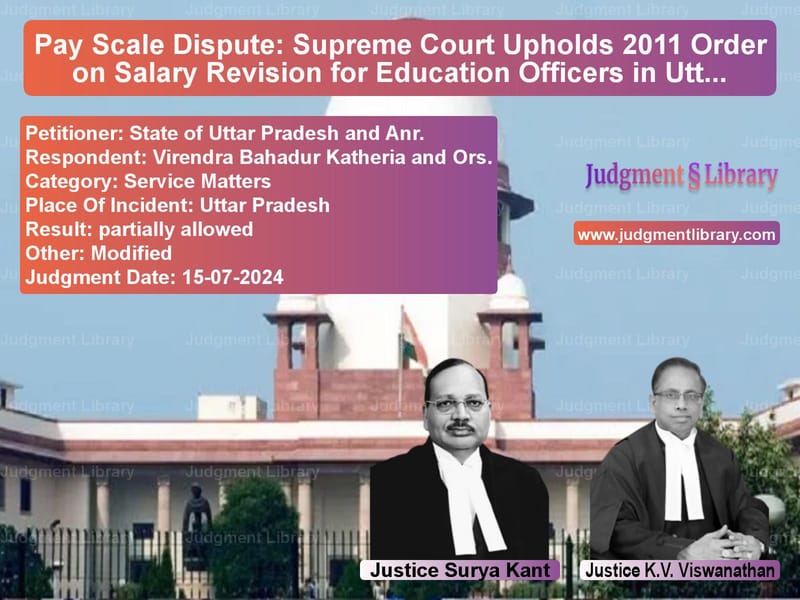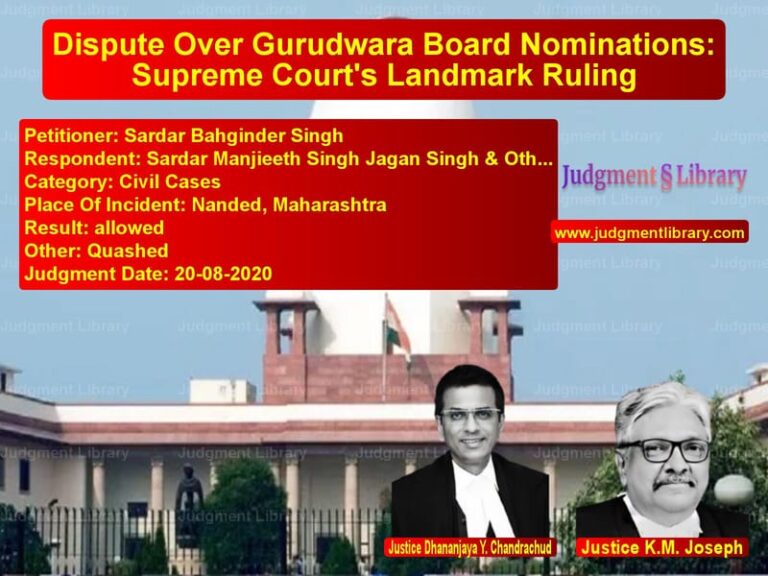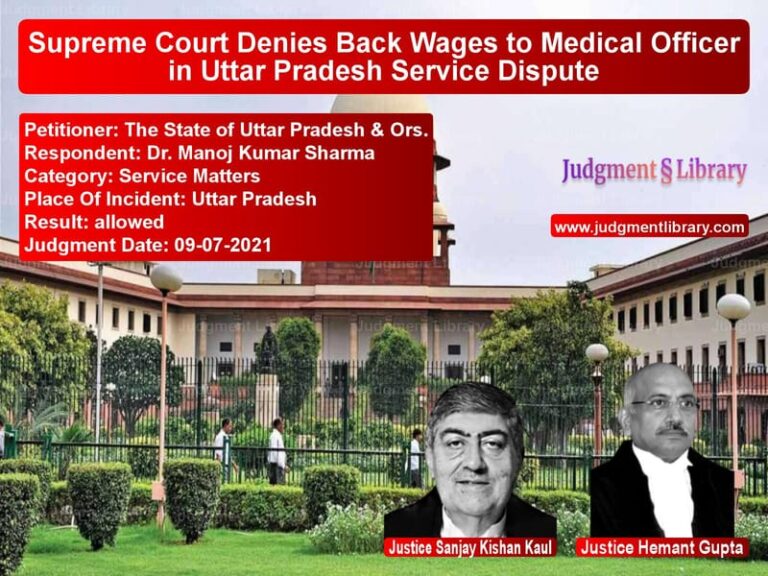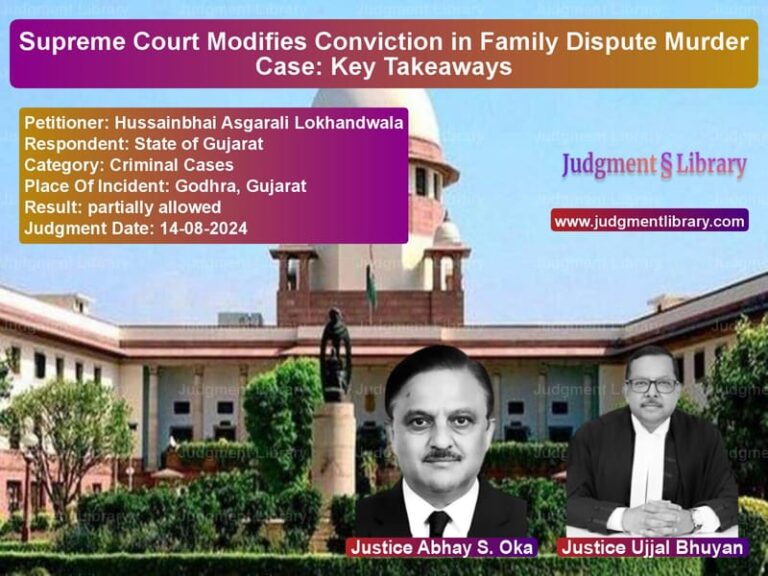Pay Scale Dispute: Supreme Court Upholds 2011 Order on Salary Revision for Education Officers in Uttar Pradesh
The Supreme Court of India recently delivered a crucial judgment in the case of State of Uttar Pradesh and Anr. vs. Virendra Bahadur Katheria and Ors., which addressed a long-standing dispute regarding pay scale anomalies for education officers in Uttar Pradesh. The Court upheld the 2011 Government Order (GO), ensuring salary revisions for Sub-Deputy Inspectors of Schools (SDI), Assistant Basic Shiksha Adhikaris (ABSA), and Deputy Basic Shiksha Adhikaris (DBSA), while restricting excessive payments and recovery orders.
Background of the Case
The dispute revolved around the pay scale disparities between education officers (SDI/ABSA/DBSA) and Headmasters of Junior High Schools. The controversy began with a 2001 Government Order that revised the pay scales of Headmasters but did not update the salaries of education officers. This led to multiple rounds of litigation over two decades, culminating in the Supreme Court’s final ruling.
Evolution of Pay Scales
To understand the issue, the Court reviewed the historical pay scale revisions for different categories:
- Headmasters’ salaries were revised from Rs. 4625-7000 to Rs. 6500-10500, with an additional selection grade scale of Rs. 7500-12000.
- SDI/ABSA and DBSA salaries were not updated after 1996, creating a situation where Headmasters received a higher salary than their supervising officers.
As a result, SDI/ABSA/DBSA officers filed a writ petition in 2002 seeking pay parity with Headmasters.
Arguments by the Petitioners (Education Officers)
- They were responsible for supervising Headmasters and had historically received higher salaries.
- The 2001 pay revision for Headmasters created an unfair discrepancy.
- They should receive at least the same pay scale as Headmasters, if not higher.
Arguments by the Respondents (State of Uttar Pradesh)
- There was no legal obligation to increase the salaries of SDI/ABSA/DBSA in line with Headmasters.
- A proposal to restructure the education officer cadre was already in place.
- The pay scale revision of 2001 applied only to teachers and was not meant for administrative officers.
First Round of Litigation (2002-2010)
The Allahabad High Court ruled in favor of education officers in 2002, directing the state to revise their pay scales. The State challenged this decision in the Supreme Court. Meanwhile, a government-appointed committee (Rizvi Committee) proposed merging education officer posts into a new cadre, with salaries revised from Rs. 7500-12000, effective from 2006.
The Supreme Court, in 2010, dismissed the State’s appeal, stating that since the State had already taken corrective measures, no further adjudication was needed. The Court directed the State to implement the revised pay scale.
Second Round of Litigation (2011-2023)
Despite the Supreme Court’s directive, implementation issues led to further disputes:
- The 2011 Government Order merged education officer posts and granted the revised pay scale of Rs. 7500-12000 from 2006 (not from 2001).
- Some officers received payments exceeding the approved scale, leading to recovery orders.
- Retired officers challenged the recovery orders, arguing that salary reductions after retirement were unfair.
A Single Judge of the High Court ruled in favor of the officers, directing the State to implement the 2002 order and provide arrears from 2001. The State delayed its appeal, leading to contempt proceedings against government officials.
Supreme Court’s Judgment (2024)
The Supreme Court ruled in favor of the State, upholding the 2011 Government Order and making the following key observations:
- The 2011 Order was in line with the Supreme Court’s previous directives and must be implemented.
- Pay scale revisions should take effect from 2006, with actual benefits payable from December 2008.
- Officers who received excess payments would not be required to return the amounts.
- Future salary structures would be based on the revised cadre system established by the Rizvi Committee.
- The judgment applied only to education officers and could not be cited as a precedent for other government employees.
The Court criticized the State’s delay in appealing the High Court’s decision but chose not to remand the case, citing the prolonged nature of the litigation.
Key Takeaways from the Judgment
- Government Pay Scale Revisions: The ruling reaffirms that salary revisions for different government posts must be carefully structured to avoid disparities.
- Doctrine of Merger: Once the Supreme Court grants leave and passes a ruling, lower court decisions merge with the Supreme Court’s decision.
- Limits on Recovery of Excess Salary: The Court protected retired employees from recovery of excess payments.
- Timely Appeals by the Government: The State was criticized for its delay in filing an appeal, leading to unnecessary contempt proceedings.
- Restriction on Future Claims: The ruling clarified that this decision applied only to education officers and could not be used by other government employees to demand similar pay hikes.
Conclusion
The Supreme Court’s decision brings finality to a two-decade-long dispute over salary structures in Uttar Pradesh’s education department. By upholding the 2011 Government Order, the Court balanced the need for pay parity while ensuring fiscal responsibility. The ruling protects retired officers from financial hardship while establishing clear guidelines for future pay scale revisions.
Petitioner Name: State of Uttar Pradesh and Anr..Respondent Name: Virendra Bahadur Katheria and Ors..Judgment By: Justice Surya Kant, Justice K.V. Viswanathan.Place Of Incident: Uttar Pradesh.Judgment Date: 15-07-2024.
Don’t miss out on the full details! Download the complete judgment in PDF format below and gain valuable insights instantly!
Download Judgment: state-of-uttar-prade-vs-virendra-bahadur-kat-supreme-court-of-india-judgment-dated-15-07-2024.pdf
Directly Download Judgment: Directly download this Judgment
See all petitions in Promotion Cases
See all petitions in Public Sector Employees
See all petitions in Recruitment Policies
See all petitions in Judgment by Surya Kant
See all petitions in Judgment by K.V. Viswanathan
See all petitions in partially allowed
See all petitions in Modified
See all petitions in supreme court of India judgments July 2024
See all petitions in 2024 judgments
See all posts in Service Matters Category
See all allowed petitions in Service Matters Category
See all Dismissed petitions in Service Matters Category
See all partially allowed petitions in Service Matters Category







